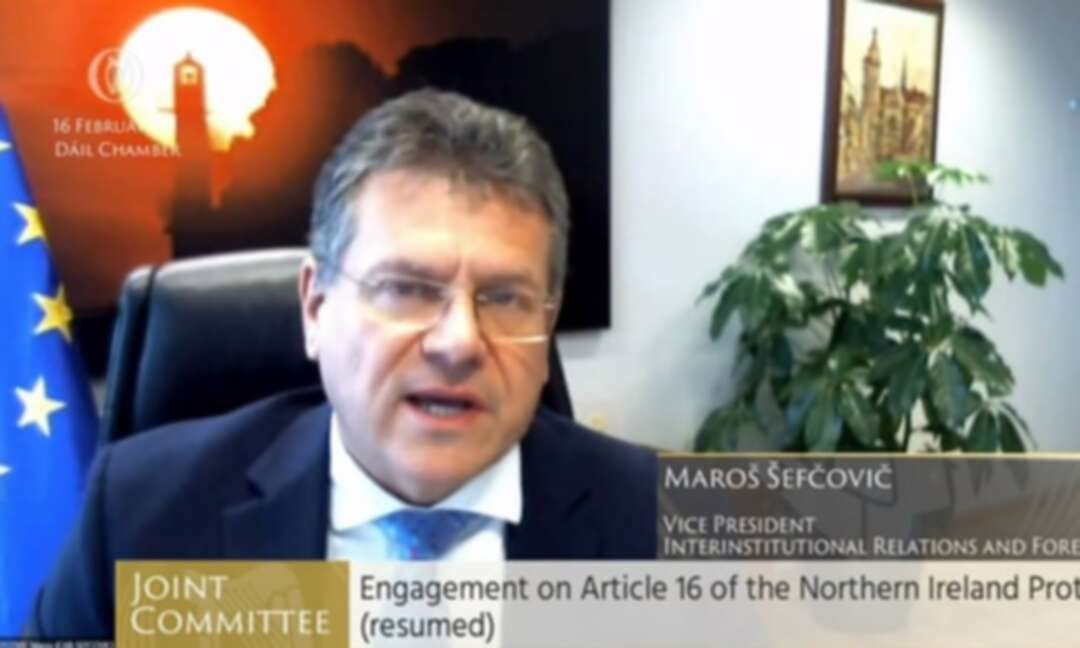-
EU 'clearing house' seeks to calm Brexit tensions over Northern Ireland

Maroš Šefčovič tells Dáil in Ireland he wants new committee to find solutions to trade problems
The EU is seeking to “de-escalate” Brexit tensions in Northern Ireland with the establishment of a new “clearing house” committee to work out solutions to issues caused by new trade barriers including controls on supermarket and chilled meat supplies.
The European commission vice-president Maroš Šefčovič said the introduction of the Northern Ireland protocol had been “administratively extremely challenging” but the EU was doing as much as possible to “calm down” and stabilise the backlash over checks and controls on goods entering the region from Great Britain.
He told MPs on Ireland’s European affairs committee that the UK rejected a transition period over issues such as the “supply chains of sausages” and that “teething problems” were inevitable.
“We knew this might happen. We have been discussing this with our UK partners for the last year.”
The barriers to supply chains have fuelled local protests, anti-protocol graffiti and an official campaign by the Democratic Unionist party to scrap the protocol completely.
Šefčovič said a new clearing house would be set up to assess any political solutions and act as an early warning system to alert both the UK and the EU to problems arising locally.
But he added the implementation of the protocol “is a shared responsibility” and the onus was on both sides to make it work. “It must be always a two-way street,” he said.
“We also have to recognise the fact that we knew from the beginning that the United Kingdom leaving the European Union, the customs union and the single market is a massive operation, that it’s not possible to prevent all the disruption.
“It was quite obvious from the beginning that there will be teething problems and I believe that we can resolve them if we work very well together,” he told the Dáil committee.
But he indicated there would be little flexibility around the protocol until the UK had implemented it fully, telling the committee that “official controls at the border control posts are currently not performed in compliance with the withdrawal agreement protocol and the European Union rules”.
There were “very few identity checks, very limited number of physical checks” and the EU could not assess the impact of trusted trader schemes and simplified health certificates for products such as chilled food until it had “real time” access to the customs data.
He will meet Northern Ireland business and civic leaders in an online summit on Thursday ahead of a meeting of the joint committee he chairs with the UK Cabinet Office minister, Michael Gove, which is due to take place no later than 24 February.
He gave little detail on the clearing house but said it would assess and evaluate political solutions to the protocol issues. It would be bolstered by the establishment of new Brexit structures including a partnership council, also to be jointly chaired by Gove and 19 “specialised committees”.
Šefčovič told the Dáil committee that he “deeply regrets” last month’s aborted attempt to suspend part of the protocol in an EU vaccine row and said there would be a monthly meeting of commissioners “with the highest stake in this new EU-UK relationship” to ensure such a blunder was not repeated.
source: Lisa O'Carroll
Levant
You May Also Like
Popular Posts
Caricature
BENEFIT Sponsors BuildHer...
- April 23, 2025
BENEFIT, the Kingdom’s innovator and leading company in Fintech and electronic financial transactions service, has sponsored the BuildHer CityHack 2025 Hackathon, a two-day event spearheaded by the College of Engineering and Technology at the Royal University for Women (RUW).
Aimed at secondary school students, the event brought together a distinguished group of academic professionals and technology experts to mentor and inspire young participants.
More than 100 high school students from across the Kingdom of Bahrain took part in the hackathon, which featured an intensive programme of training workshops and hands-on sessions. These activities were tailored to enhance participants’ critical thinking, collaborative problem-solving, and team-building capabilities, while also encouraging the development of practical and sustainable solutions to contemporary challenges using modern technological tools.
BENEFIT’s Chief Executive Mr. Abdulwahed AlJanahi, commented: “Our support for this educational hackathon reflects our long-term strategic vision to nurture the talents of emerging national youth and empower the next generation of accomplished female leaders in technology. By fostering creativity and innovation, we aim to contribute meaningfully to Bahrain’s comprehensive development goals and align with the aspirations outlined in the Kingdom’s Vision 2030—an ambition in which BENEFIT plays a central role.”
Professor Riyadh Yousif Hamzah, President of the Royal University for Women, commented: “This initiative reflects our commitment to advancing women in STEM fields. We're cultivating a generation of creative, solution-driven female leaders who will drive national development. Our partnership with BENEFIT exemplifies the powerful synergy between academia and private sector in supporting educational innovation.”
Hanan Abdulla Hasan, Senior Manager, PR & Communication at BENEFIT, said: “We are honoured to collaborate with RUW in supporting this remarkable technology-focused event. It highlights our commitment to social responsibility, and our ongoing efforts to enhance the digital and innovation capabilities of young Bahraini women and foster their ability to harness technological tools in the service of a smarter, more sustainable future.”
For his part, Dr. Humam ElAgha, Acting Dean of the College of Engineering and Technology at the University, said: “BuildHer CityHack 2025 embodies our hands-on approach to education. By tackling real-world problems through creative thinking and sustainable solutions, we're preparing women to thrive in the knowledge economy – a cornerstone of the University's vision.”
opinion
Report
ads
Newsletter
Subscribe to our mailing list to get the new updates!






















